Leadership Assignment: Critique of Leadership Theories and Practices
VerifiedAdded on 2023/03/31
|12
|2558
|333
Report
AI Summary
This report presents a critical analysis of two journal articles on leadership. The first article, "Transformative leadership: Achieving unparalleled excellence," explores the development of a transformative leadership model, integrating perspectives from various leadership styles to enhance organizational outcomes. The second article, "Embedding ethical leadership within and across organization levels," investigates how ethical leadership influences ethical culture and behavior across different organizational levels. The report provides an overview of each article, compares their arguments, and offers a critique supported by relevant literature and personal work experiences. The analysis focuses on the theories, values, and assumptions underpinning the articles, examining their relationship to leadership practices and offering insights into the complexities of ethical and transformative leadership within organizations. The report also discusses the practical application of these leadership styles, referencing real-world examples like Tesco, and highlights the importance of aligning leadership styles with situational contexts, as supported by the Contingency theory.
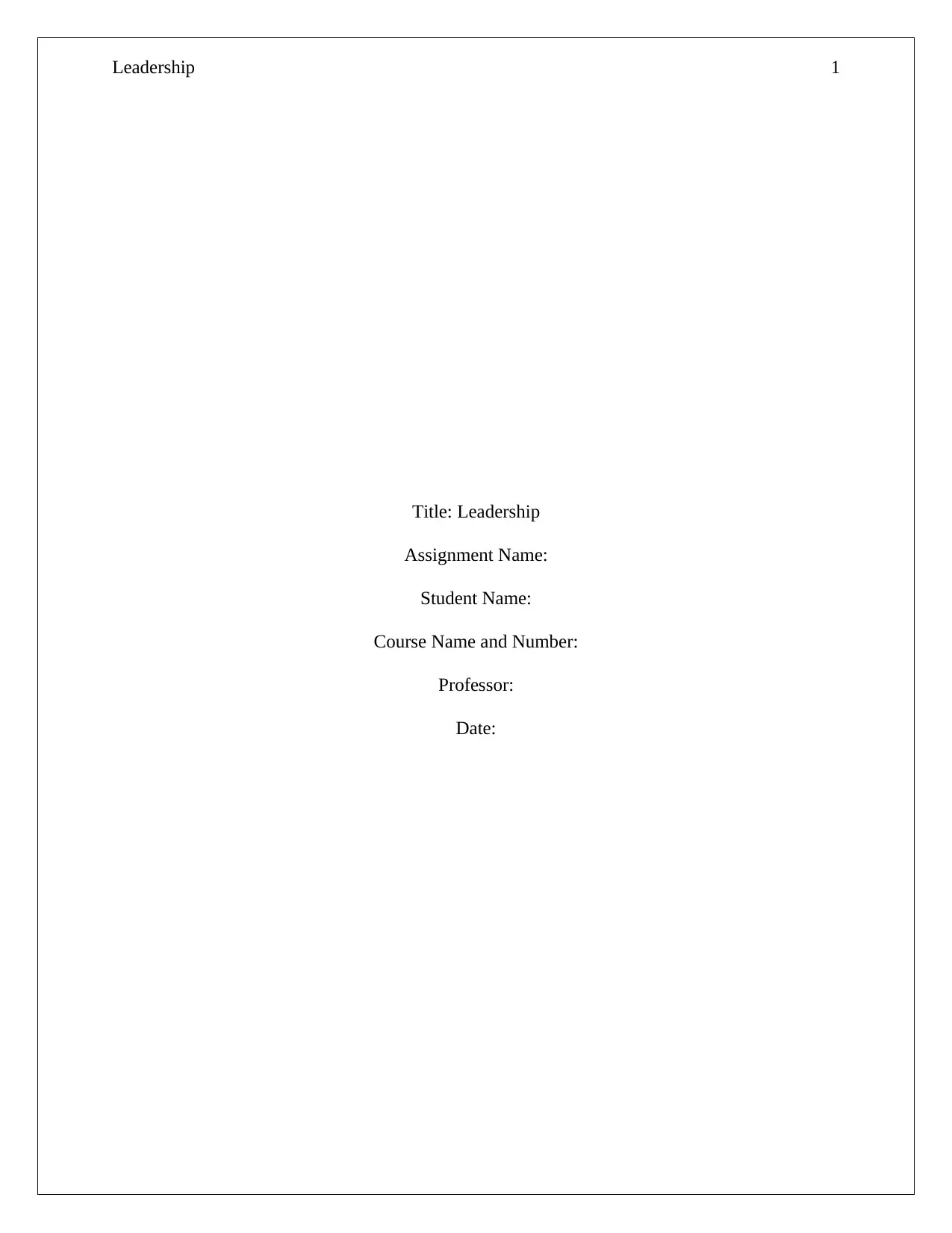
Leadership 1
Title: Leadership
Assignment Name:
Student Name:
Course Name and Number:
Professor:
Date:
Title: Leadership
Assignment Name:
Student Name:
Course Name and Number:
Professor:
Date:
Paraphrase This Document
Need a fresh take? Get an instant paraphrase of this document with our AI Paraphraser
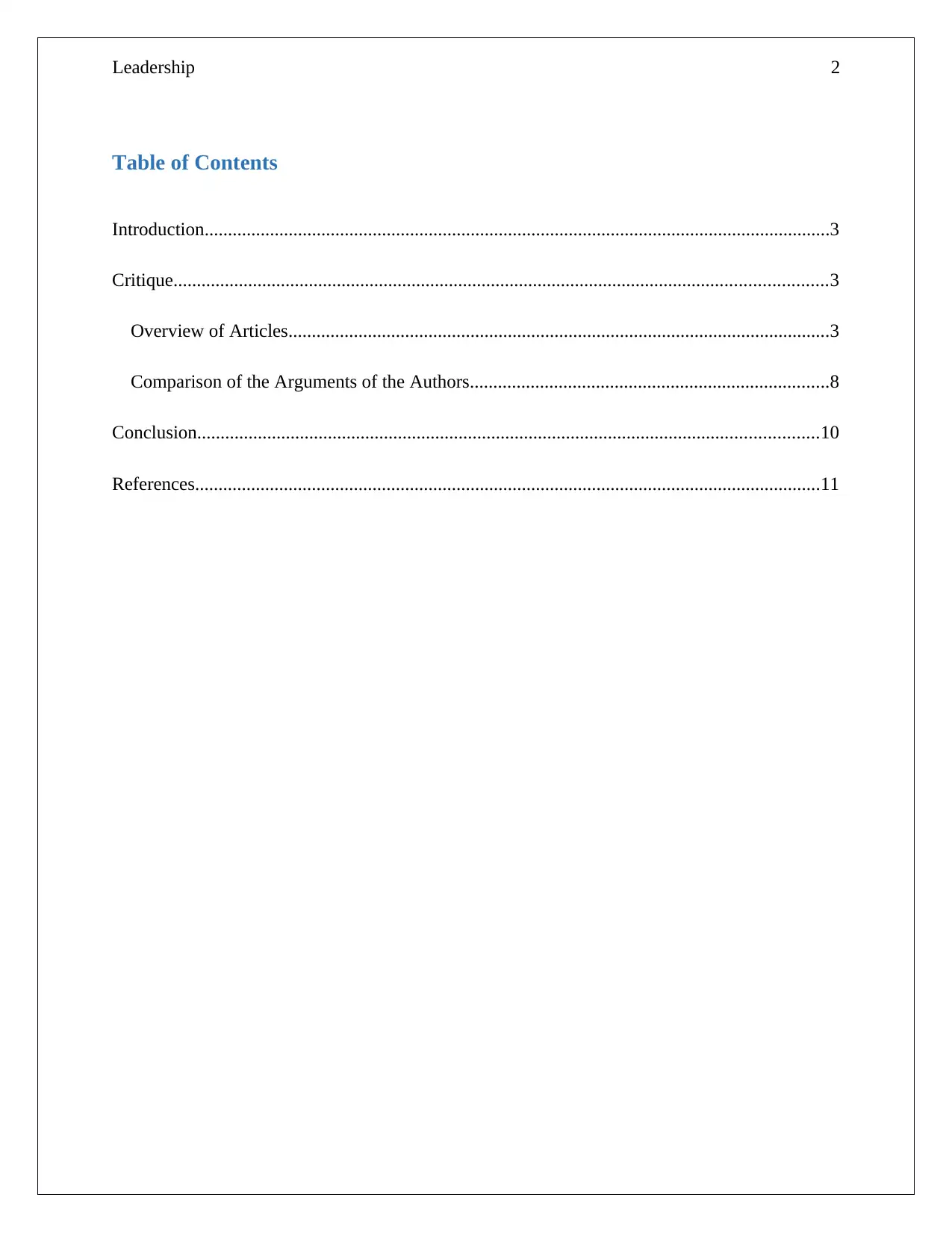
Leadership 2
Table of Contents
Introduction......................................................................................................................................3
Critique............................................................................................................................................3
Overview of Articles....................................................................................................................3
Comparison of the Arguments of the Authors.............................................................................8
Conclusion.....................................................................................................................................10
References......................................................................................................................................11
Table of Contents
Introduction......................................................................................................................................3
Critique............................................................................................................................................3
Overview of Articles....................................................................................................................3
Comparison of the Arguments of the Authors.............................................................................8
Conclusion.....................................................................................................................................10
References......................................................................................................................................11
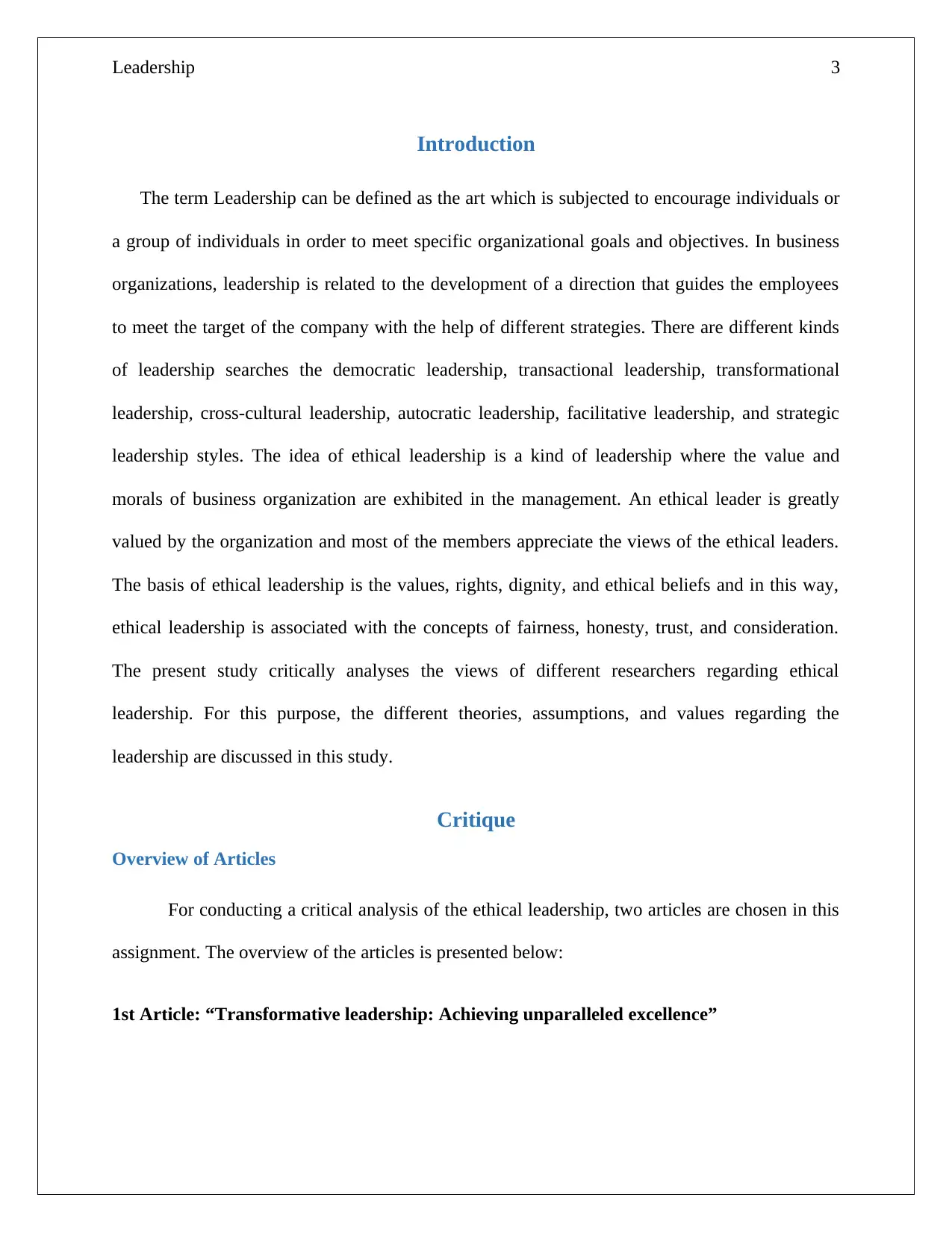
Leadership 3
Introduction
The term Leadership can be defined as the art which is subjected to encourage individuals or
a group of individuals in order to meet specific organizational goals and objectives. In business
organizations, leadership is related to the development of a direction that guides the employees
to meet the target of the company with the help of different strategies. There are different kinds
of leadership searches the democratic leadership, transactional leadership, transformational
leadership, cross-cultural leadership, autocratic leadership, facilitative leadership, and strategic
leadership styles. The idea of ethical leadership is a kind of leadership where the value and
morals of business organization are exhibited in the management. An ethical leader is greatly
valued by the organization and most of the members appreciate the views of the ethical leaders.
The basis of ethical leadership is the values, rights, dignity, and ethical beliefs and in this way,
ethical leadership is associated with the concepts of fairness, honesty, trust, and consideration.
The present study critically analyses the views of different researchers regarding ethical
leadership. For this purpose, the different theories, assumptions, and values regarding the
leadership are discussed in this study.
Critique
Overview of Articles
For conducting a critical analysis of the ethical leadership, two articles are chosen in this
assignment. The overview of the articles is presented below:
1st Article: “Transformative leadership: Achieving unparalleled excellence”
Introduction
The term Leadership can be defined as the art which is subjected to encourage individuals or
a group of individuals in order to meet specific organizational goals and objectives. In business
organizations, leadership is related to the development of a direction that guides the employees
to meet the target of the company with the help of different strategies. There are different kinds
of leadership searches the democratic leadership, transactional leadership, transformational
leadership, cross-cultural leadership, autocratic leadership, facilitative leadership, and strategic
leadership styles. The idea of ethical leadership is a kind of leadership where the value and
morals of business organization are exhibited in the management. An ethical leader is greatly
valued by the organization and most of the members appreciate the views of the ethical leaders.
The basis of ethical leadership is the values, rights, dignity, and ethical beliefs and in this way,
ethical leadership is associated with the concepts of fairness, honesty, trust, and consideration.
The present study critically analyses the views of different researchers regarding ethical
leadership. For this purpose, the different theories, assumptions, and values regarding the
leadership are discussed in this study.
Critique
Overview of Articles
For conducting a critical analysis of the ethical leadership, two articles are chosen in this
assignment. The overview of the articles is presented below:
1st Article: “Transformative leadership: Achieving unparalleled excellence”
⊘ This is a preview!⊘
Do you want full access?
Subscribe today to unlock all pages.

Trusted by 1+ million students worldwide
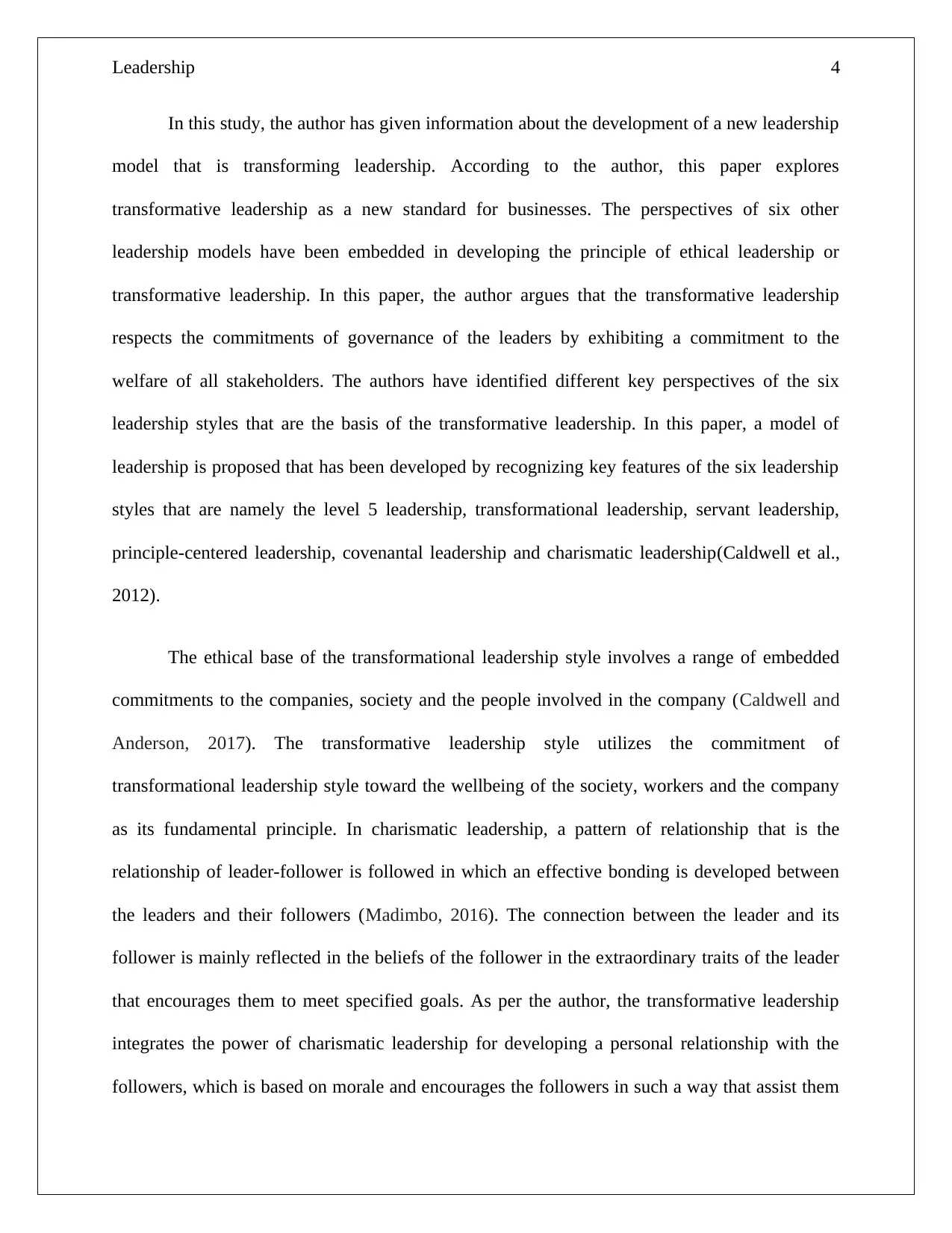
Leadership 4
In this study, the author has given information about the development of a new leadership
model that is transforming leadership. According to the author, this paper explores
transformative leadership as a new standard for businesses. The perspectives of six other
leadership models have been embedded in developing the principle of ethical leadership or
transformative leadership. In this paper, the author argues that the transformative leadership
respects the commitments of governance of the leaders by exhibiting a commitment to the
welfare of all stakeholders. The authors have identified different key perspectives of the six
leadership styles that are the basis of the transformative leadership. In this paper, a model of
leadership is proposed that has been developed by recognizing key features of the six leadership
styles that are namely the level 5 leadership, transformational leadership, servant leadership,
principle-centered leadership, covenantal leadership and charismatic leadership(Caldwell et al.,
2012).
The ethical base of the transformational leadership style involves a range of embedded
commitments to the companies, society and the people involved in the company (Caldwell and
Anderson, 2017). The transformative leadership style utilizes the commitment of
transformational leadership style toward the wellbeing of the society, workers and the company
as its fundamental principle. In charismatic leadership, a pattern of relationship that is the
relationship of leader-follower is followed in which an effective bonding is developed between
the leaders and their followers (Madimbo, 2016). The connection between the leader and its
follower is mainly reflected in the beliefs of the follower in the extraordinary traits of the leader
that encourages them to meet specified goals. As per the author, the transformative leadership
integrates the power of charismatic leadership for developing a personal relationship with the
followers, which is based on morale and encourages the followers in such a way that assist them
In this study, the author has given information about the development of a new leadership
model that is transforming leadership. According to the author, this paper explores
transformative leadership as a new standard for businesses. The perspectives of six other
leadership models have been embedded in developing the principle of ethical leadership or
transformative leadership. In this paper, the author argues that the transformative leadership
respects the commitments of governance of the leaders by exhibiting a commitment to the
welfare of all stakeholders. The authors have identified different key perspectives of the six
leadership styles that are the basis of the transformative leadership. In this paper, a model of
leadership is proposed that has been developed by recognizing key features of the six leadership
styles that are namely the level 5 leadership, transformational leadership, servant leadership,
principle-centered leadership, covenantal leadership and charismatic leadership(Caldwell et al.,
2012).
The ethical base of the transformational leadership style involves a range of embedded
commitments to the companies, society and the people involved in the company (Caldwell and
Anderson, 2017). The transformative leadership style utilizes the commitment of
transformational leadership style toward the wellbeing of the society, workers and the company
as its fundamental principle. In charismatic leadership, a pattern of relationship that is the
relationship of leader-follower is followed in which an effective bonding is developed between
the leaders and their followers (Madimbo, 2016). The connection between the leader and its
follower is mainly reflected in the beliefs of the follower in the extraordinary traits of the leader
that encourages them to meet specified goals. As per the author, the transformative leadership
integrates the power of charismatic leadership for developing a personal relationship with the
followers, which is based on morale and encourages the followers in such a way that assist them
Paraphrase This Document
Need a fresh take? Get an instant paraphrase of this document with our AI Paraphraser
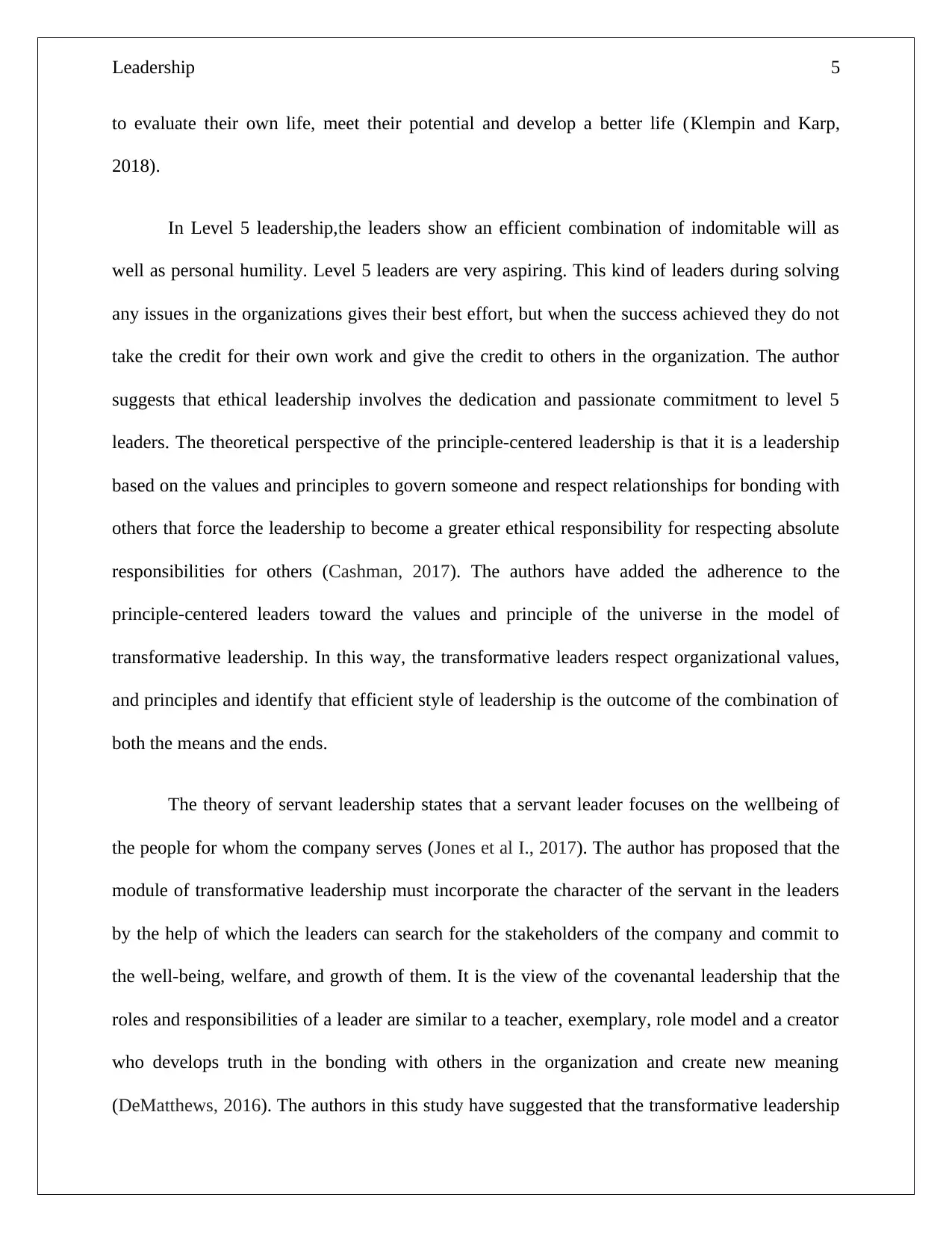
Leadership 5
to evaluate their own life, meet their potential and develop a better life (Klempin and Karp,
2018).
In Level 5 leadership,the leaders show an efficient combination of indomitable will as
well as personal humility. Level 5 leaders are very aspiring. This kind of leaders during solving
any issues in the organizations gives their best effort, but when the success achieved they do not
take the credit for their own work and give the credit to others in the organization. The author
suggests that ethical leadership involves the dedication and passionate commitment to level 5
leaders. The theoretical perspective of the principle-centered leadership is that it is a leadership
based on the values and principles to govern someone and respect relationships for bonding with
others that force the leadership to become a greater ethical responsibility for respecting absolute
responsibilities for others (Cashman, 2017). The authors have added the adherence to the
principle-centered leaders toward the values and principle of the universe in the model of
transformative leadership. In this way, the transformative leaders respect organizational values,
and principles and identify that efficient style of leadership is the outcome of the combination of
both the means and the ends.
The theory of servant leadership states that a servant leader focuses on the wellbeing of
the people for whom the company serves (Jones et al I., 2017). The author has proposed that the
module of transformative leadership must incorporate the character of the servant in the leaders
by the help of which the leaders can search for the stakeholders of the company and commit to
the well-being, welfare, and growth of them. It is the view of the covenantal leadership that the
roles and responsibilities of a leader are similar to a teacher, exemplary, role model and a creator
who develops truth in the bonding with others in the organization and create new meaning
(DeMatthews, 2016). The authors in this study have suggested that the transformative leadership
to evaluate their own life, meet their potential and develop a better life (Klempin and Karp,
2018).
In Level 5 leadership,the leaders show an efficient combination of indomitable will as
well as personal humility. Level 5 leaders are very aspiring. This kind of leaders during solving
any issues in the organizations gives their best effort, but when the success achieved they do not
take the credit for their own work and give the credit to others in the organization. The author
suggests that ethical leadership involves the dedication and passionate commitment to level 5
leaders. The theoretical perspective of the principle-centered leadership is that it is a leadership
based on the values and principles to govern someone and respect relationships for bonding with
others that force the leadership to become a greater ethical responsibility for respecting absolute
responsibilities for others (Cashman, 2017). The authors have added the adherence to the
principle-centered leaders toward the values and principle of the universe in the model of
transformative leadership. In this way, the transformative leaders respect organizational values,
and principles and identify that efficient style of leadership is the outcome of the combination of
both the means and the ends.
The theory of servant leadership states that a servant leader focuses on the wellbeing of
the people for whom the company serves (Jones et al I., 2017). The author has proposed that the
module of transformative leadership must incorporate the character of the servant in the leaders
by the help of which the leaders can search for the stakeholders of the company and commit to
the well-being, welfare, and growth of them. It is the view of the covenantal leadership that the
roles and responsibilities of a leader are similar to a teacher, exemplary, role model and a creator
who develops truth in the bonding with others in the organization and create new meaning
(DeMatthews, 2016). The authors in this study have suggested that the transformative leadership
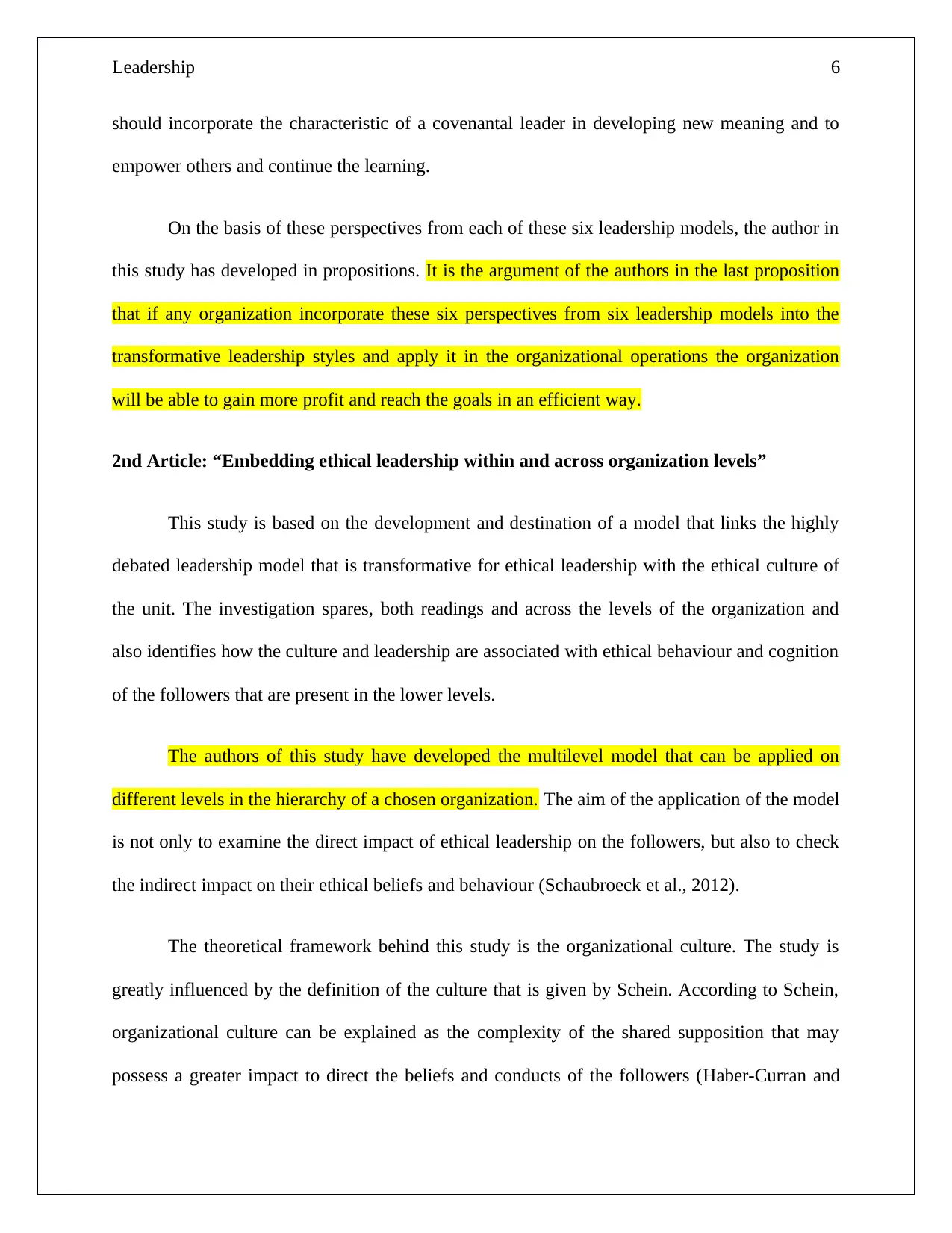
Leadership 6
should incorporate the characteristic of a covenantal leader in developing new meaning and to
empower others and continue the learning.
On the basis of these perspectives from each of these six leadership models, the author in
this study has developed in propositions. It is the argument of the authors in the last proposition
that if any organization incorporate these six perspectives from six leadership models into the
transformative leadership styles and apply it in the organizational operations the organization
will be able to gain more profit and reach the goals in an efficient way.
2nd Article: “Embedding ethical leadership within and across organization levels”
This study is based on the development and destination of a model that links the highly
debated leadership model that is transformative for ethical leadership with the ethical culture of
the unit. The investigation spares, both readings and across the levels of the organization and
also identifies how the culture and leadership are associated with ethical behaviour and cognition
of the followers that are present in the lower levels.
The authors of this study have developed the multilevel model that can be applied on
different levels in the hierarchy of a chosen organization. The aim of the application of the model
is not only to examine the direct impact of ethical leadership on the followers, but also to check
the indirect impact on their ethical beliefs and behaviour (Schaubroeck et al., 2012).
The theoretical framework behind this study is the organizational culture. The study is
greatly influenced by the definition of the culture that is given by Schein. According to Schein,
organizational culture can be explained as the complexity of the shared supposition that may
possess a greater impact to direct the beliefs and conducts of the followers (Haber-Curran and
should incorporate the characteristic of a covenantal leader in developing new meaning and to
empower others and continue the learning.
On the basis of these perspectives from each of these six leadership models, the author in
this study has developed in propositions. It is the argument of the authors in the last proposition
that if any organization incorporate these six perspectives from six leadership models into the
transformative leadership styles and apply it in the organizational operations the organization
will be able to gain more profit and reach the goals in an efficient way.
2nd Article: “Embedding ethical leadership within and across organization levels”
This study is based on the development and destination of a model that links the highly
debated leadership model that is transformative for ethical leadership with the ethical culture of
the unit. The investigation spares, both readings and across the levels of the organization and
also identifies how the culture and leadership are associated with ethical behaviour and cognition
of the followers that are present in the lower levels.
The authors of this study have developed the multilevel model that can be applied on
different levels in the hierarchy of a chosen organization. The aim of the application of the model
is not only to examine the direct impact of ethical leadership on the followers, but also to check
the indirect impact on their ethical beliefs and behaviour (Schaubroeck et al., 2012).
The theoretical framework behind this study is the organizational culture. The study is
greatly influenced by the definition of the culture that is given by Schein. According to Schein,
organizational culture can be explained as the complexity of the shared supposition that may
possess a greater impact to direct the beliefs and conducts of the followers (Haber-Curran and
⊘ This is a preview!⊘
Do you want full access?
Subscribe today to unlock all pages.

Trusted by 1+ million students worldwide
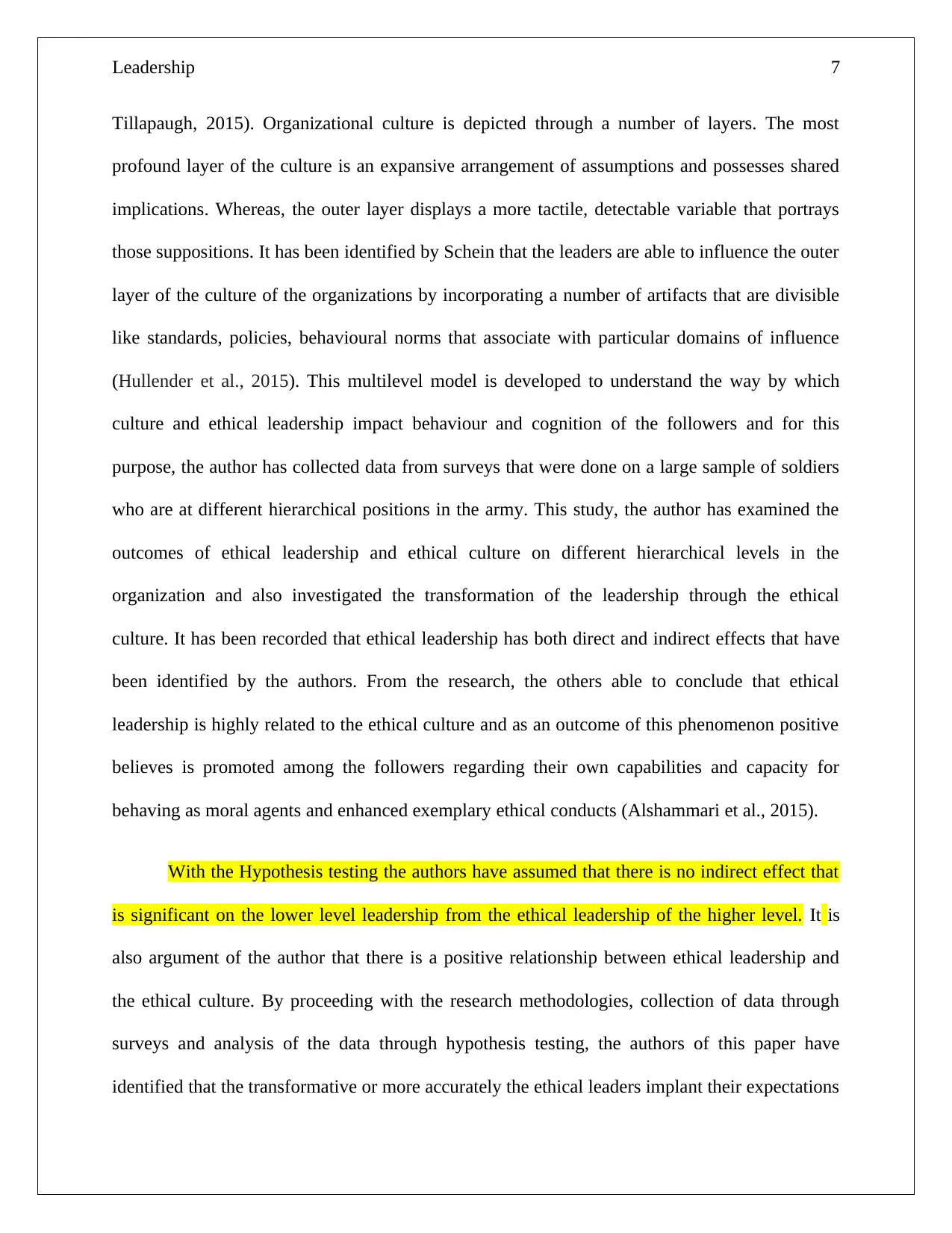
Leadership 7
Tillapaugh, 2015). Organizational culture is depicted through a number of layers. The most
profound layer of the culture is an expansive arrangement of assumptions and possesses shared
implications. Whereas, the outer layer displays a more tactile, detectable variable that portrays
those suppositions. It has been identified by Schein that the leaders are able to influence the outer
layer of the culture of the organizations by incorporating a number of artifacts that are divisible
like standards, policies, behavioural norms that associate with particular domains of influence
(Hullender et al., 2015). This multilevel model is developed to understand the way by which
culture and ethical leadership impact behaviour and cognition of the followers and for this
purpose, the author has collected data from surveys that were done on a large sample of soldiers
who are at different hierarchical positions in the army. This study, the author has examined the
outcomes of ethical leadership and ethical culture on different hierarchical levels in the
organization and also investigated the transformation of the leadership through the ethical
culture. It has been recorded that ethical leadership has both direct and indirect effects that have
been identified by the authors. From the research, the others able to conclude that ethical
leadership is highly related to the ethical culture and as an outcome of this phenomenon positive
believes is promoted among the followers regarding their own capabilities and capacity for
behaving as moral agents and enhanced exemplary ethical conducts (Alshammari et al., 2015).
With the Hypothesis testing the authors have assumed that there is no indirect effect that
is significant on the lower level leadership from the ethical leadership of the higher level. It is
also argument of the author that there is a positive relationship between ethical leadership and
the ethical culture. By proceeding with the research methodologies, collection of data through
surveys and analysis of the data through hypothesis testing, the authors of this paper have
identified that the transformative or more accurately the ethical leaders implant their expectations
Tillapaugh, 2015). Organizational culture is depicted through a number of layers. The most
profound layer of the culture is an expansive arrangement of assumptions and possesses shared
implications. Whereas, the outer layer displays a more tactile, detectable variable that portrays
those suppositions. It has been identified by Schein that the leaders are able to influence the outer
layer of the culture of the organizations by incorporating a number of artifacts that are divisible
like standards, policies, behavioural norms that associate with particular domains of influence
(Hullender et al., 2015). This multilevel model is developed to understand the way by which
culture and ethical leadership impact behaviour and cognition of the followers and for this
purpose, the author has collected data from surveys that were done on a large sample of soldiers
who are at different hierarchical positions in the army. This study, the author has examined the
outcomes of ethical leadership and ethical culture on different hierarchical levels in the
organization and also investigated the transformation of the leadership through the ethical
culture. It has been recorded that ethical leadership has both direct and indirect effects that have
been identified by the authors. From the research, the others able to conclude that ethical
leadership is highly related to the ethical culture and as an outcome of this phenomenon positive
believes is promoted among the followers regarding their own capabilities and capacity for
behaving as moral agents and enhanced exemplary ethical conducts (Alshammari et al., 2015).
With the Hypothesis testing the authors have assumed that there is no indirect effect that
is significant on the lower level leadership from the ethical leadership of the higher level. It is
also argument of the author that there is a positive relationship between ethical leadership and
the ethical culture. By proceeding with the research methodologies, collection of data through
surveys and analysis of the data through hypothesis testing, the authors of this paper have
identified that the transformative or more accurately the ethical leaders implant their expectations
Paraphrase This Document
Need a fresh take? Get an instant paraphrase of this document with our AI Paraphraser
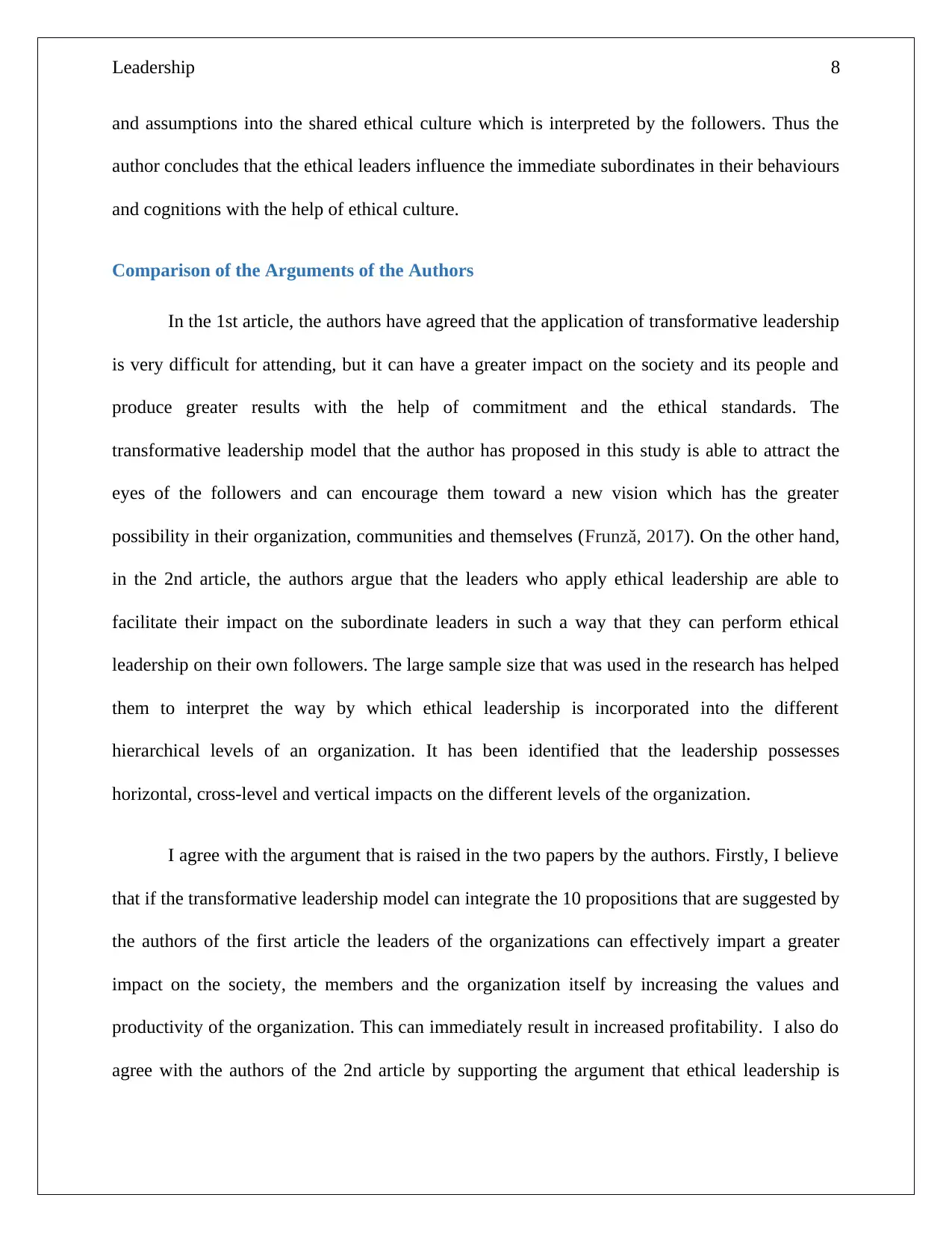
Leadership 8
and assumptions into the shared ethical culture which is interpreted by the followers. Thus the
author concludes that the ethical leaders influence the immediate subordinates in their behaviours
and cognitions with the help of ethical culture.
Comparison of the Arguments of the Authors
In the 1st article, the authors have agreed that the application of transformative leadership
is very difficult for attending, but it can have a greater impact on the society and its people and
produce greater results with the help of commitment and the ethical standards. The
transformative leadership model that the author has proposed in this study is able to attract the
eyes of the followers and can encourage them toward a new vision which has the greater
possibility in their organization, communities and themselves (Frunză, 2017). On the other hand,
in the 2nd article, the authors argue that the leaders who apply ethical leadership are able to
facilitate their impact on the subordinate leaders in such a way that they can perform ethical
leadership on their own followers. The large sample size that was used in the research has helped
them to interpret the way by which ethical leadership is incorporated into the different
hierarchical levels of an organization. It has been identified that the leadership possesses
horizontal, cross-level and vertical impacts on the different levels of the organization.
I agree with the argument that is raised in the two papers by the authors. Firstly, I believe
that if the transformative leadership model can integrate the 10 propositions that are suggested by
the authors of the first article the leaders of the organizations can effectively impart a greater
impact on the society, the members and the organization itself by increasing the values and
productivity of the organization. This can immediately result in increased profitability. I also do
agree with the authors of the 2nd article by supporting the argument that ethical leadership is
and assumptions into the shared ethical culture which is interpreted by the followers. Thus the
author concludes that the ethical leaders influence the immediate subordinates in their behaviours
and cognitions with the help of ethical culture.
Comparison of the Arguments of the Authors
In the 1st article, the authors have agreed that the application of transformative leadership
is very difficult for attending, but it can have a greater impact on the society and its people and
produce greater results with the help of commitment and the ethical standards. The
transformative leadership model that the author has proposed in this study is able to attract the
eyes of the followers and can encourage them toward a new vision which has the greater
possibility in their organization, communities and themselves (Frunză, 2017). On the other hand,
in the 2nd article, the authors argue that the leaders who apply ethical leadership are able to
facilitate their impact on the subordinate leaders in such a way that they can perform ethical
leadership on their own followers. The large sample size that was used in the research has helped
them to interpret the way by which ethical leadership is incorporated into the different
hierarchical levels of an organization. It has been identified that the leadership possesses
horizontal, cross-level and vertical impacts on the different levels of the organization.
I agree with the argument that is raised in the two papers by the authors. Firstly, I believe
that if the transformative leadership model can integrate the 10 propositions that are suggested by
the authors of the first article the leaders of the organizations can effectively impart a greater
impact on the society, the members and the organization itself by increasing the values and
productivity of the organization. This can immediately result in increased profitability. I also do
agree with the authors of the 2nd article by supporting the argument that ethical leadership is
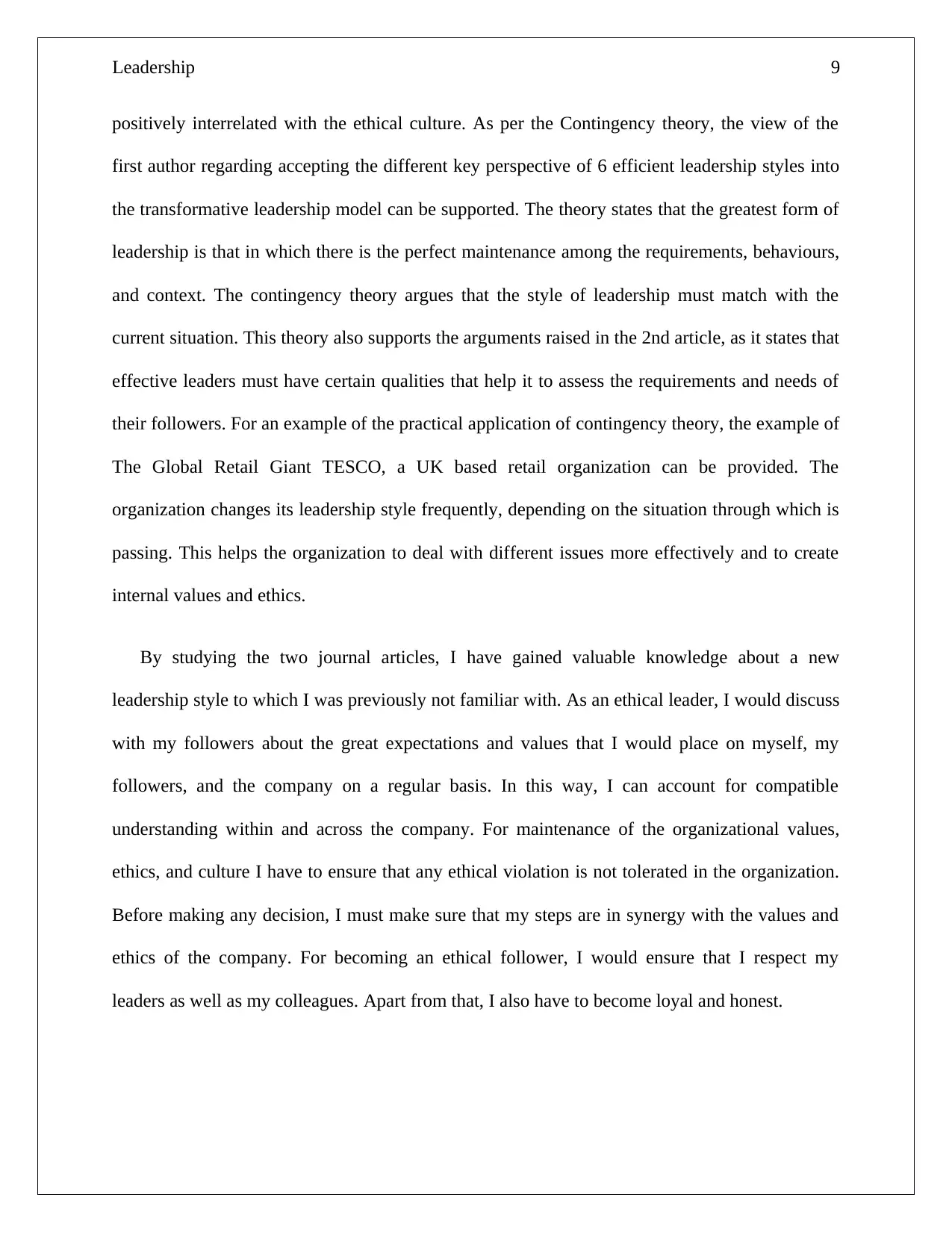
Leadership 9
positively interrelated with the ethical culture. As per the Contingency theory, the view of the
first author regarding accepting the different key perspective of 6 efficient leadership styles into
the transformative leadership model can be supported. The theory states that the greatest form of
leadership is that in which there is the perfect maintenance among the requirements, behaviours,
and context. The contingency theory argues that the style of leadership must match with the
current situation. This theory also supports the arguments raised in the 2nd article, as it states that
effective leaders must have certain qualities that help it to assess the requirements and needs of
their followers. For an example of the practical application of contingency theory, the example of
The Global Retail Giant TESCO, a UK based retail organization can be provided. The
organization changes its leadership style frequently, depending on the situation through which is
passing. This helps the organization to deal with different issues more effectively and to create
internal values and ethics.
By studying the two journal articles, I have gained valuable knowledge about a new
leadership style to which I was previously not familiar with. As an ethical leader, I would discuss
with my followers about the great expectations and values that I would place on myself, my
followers, and the company on a regular basis. In this way, I can account for compatible
understanding within and across the company. For maintenance of the organizational values,
ethics, and culture I have to ensure that any ethical violation is not tolerated in the organization.
Before making any decision, I must make sure that my steps are in synergy with the values and
ethics of the company. For becoming an ethical follower, I would ensure that I respect my
leaders as well as my colleagues. Apart from that, I also have to become loyal and honest.
positively interrelated with the ethical culture. As per the Contingency theory, the view of the
first author regarding accepting the different key perspective of 6 efficient leadership styles into
the transformative leadership model can be supported. The theory states that the greatest form of
leadership is that in which there is the perfect maintenance among the requirements, behaviours,
and context. The contingency theory argues that the style of leadership must match with the
current situation. This theory also supports the arguments raised in the 2nd article, as it states that
effective leaders must have certain qualities that help it to assess the requirements and needs of
their followers. For an example of the practical application of contingency theory, the example of
The Global Retail Giant TESCO, a UK based retail organization can be provided. The
organization changes its leadership style frequently, depending on the situation through which is
passing. This helps the organization to deal with different issues more effectively and to create
internal values and ethics.
By studying the two journal articles, I have gained valuable knowledge about a new
leadership style to which I was previously not familiar with. As an ethical leader, I would discuss
with my followers about the great expectations and values that I would place on myself, my
followers, and the company on a regular basis. In this way, I can account for compatible
understanding within and across the company. For maintenance of the organizational values,
ethics, and culture I have to ensure that any ethical violation is not tolerated in the organization.
Before making any decision, I must make sure that my steps are in synergy with the values and
ethics of the company. For becoming an ethical follower, I would ensure that I respect my
leaders as well as my colleagues. Apart from that, I also have to become loyal and honest.
⊘ This is a preview!⊘
Do you want full access?
Subscribe today to unlock all pages.

Trusted by 1+ million students worldwide
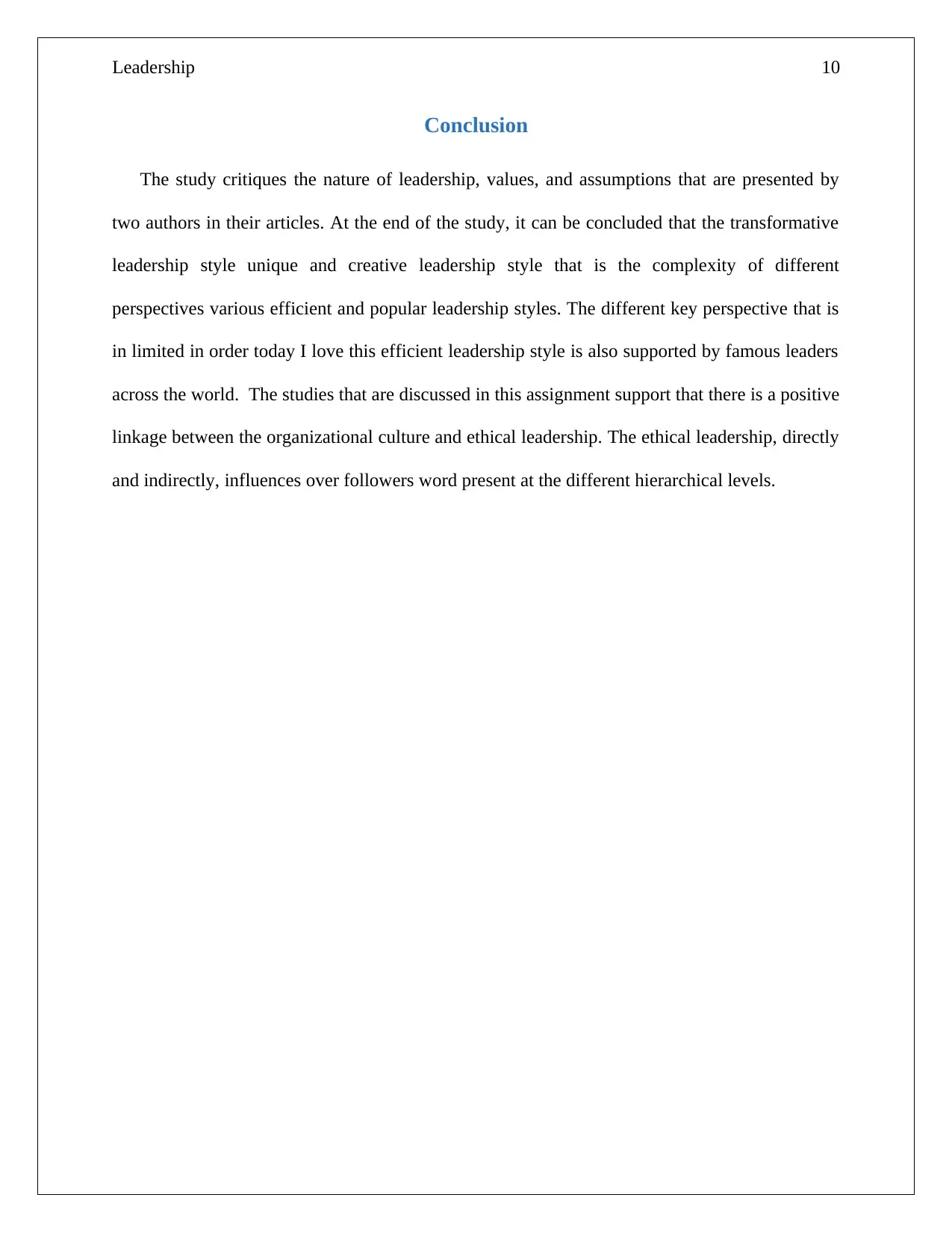
Leadership 10
Conclusion
The study critiques the nature of leadership, values, and assumptions that are presented by
two authors in their articles. At the end of the study, it can be concluded that the transformative
leadership style unique and creative leadership style that is the complexity of different
perspectives various efficient and popular leadership styles. The different key perspective that is
in limited in order today I love this efficient leadership style is also supported by famous leaders
across the world. The studies that are discussed in this assignment support that there is a positive
linkage between the organizational culture and ethical leadership. The ethical leadership, directly
and indirectly, influences over followers word present at the different hierarchical levels.
Conclusion
The study critiques the nature of leadership, values, and assumptions that are presented by
two authors in their articles. At the end of the study, it can be concluded that the transformative
leadership style unique and creative leadership style that is the complexity of different
perspectives various efficient and popular leadership styles. The different key perspective that is
in limited in order today I love this efficient leadership style is also supported by famous leaders
across the world. The studies that are discussed in this assignment support that there is a positive
linkage between the organizational culture and ethical leadership. The ethical leadership, directly
and indirectly, influences over followers word present at the different hierarchical levels.
Paraphrase This Document
Need a fresh take? Get an instant paraphrase of this document with our AI Paraphraser
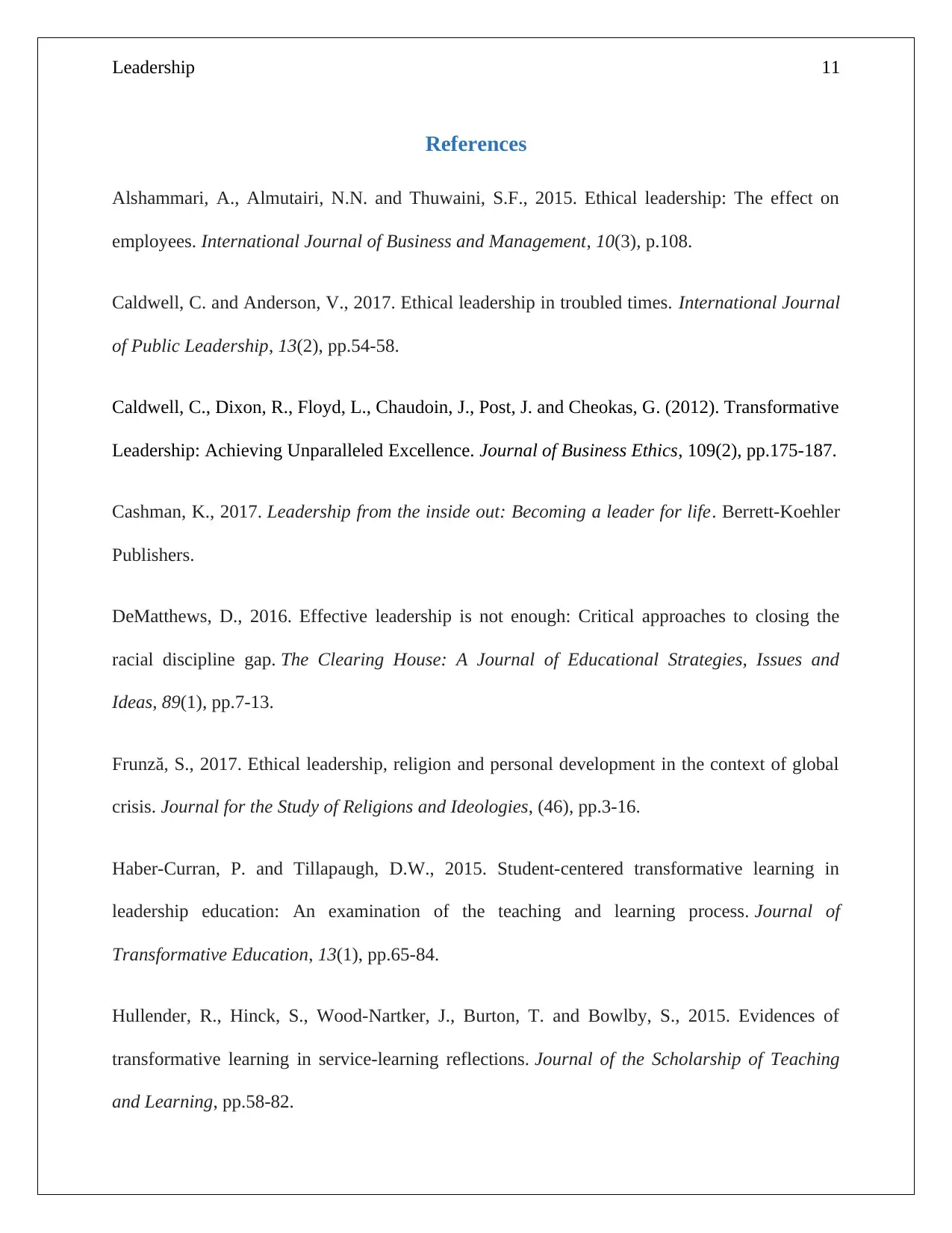
Leadership 11
References
Alshammari, A., Almutairi, N.N. and Thuwaini, S.F., 2015. Ethical leadership: The effect on
employees. International Journal of Business and Management, 10(3), p.108.
Caldwell, C. and Anderson, V., 2017. Ethical leadership in troubled times. International Journal
of Public Leadership, 13(2), pp.54-58.
Caldwell, C., Dixon, R., Floyd, L., Chaudoin, J., Post, J. and Cheokas, G. (2012). Transformative
Leadership: Achieving Unparalleled Excellence. Journal of Business Ethics, 109(2), pp.175-187.
Cashman, K., 2017. Leadership from the inside out: Becoming a leader for life. Berrett-Koehler
Publishers.
DeMatthews, D., 2016. Effective leadership is not enough: Critical approaches to closing the
racial discipline gap. The Clearing House: A Journal of Educational Strategies, Issues and
Ideas, 89(1), pp.7-13.
Frunză, S., 2017. Ethical leadership, religion and personal development in the context of global
crisis. Journal for the Study of Religions and Ideologies, (46), pp.3-16.
Haber-Curran, P. and Tillapaugh, D.W., 2015. Student-centered transformative learning in
leadership education: An examination of the teaching and learning process. Journal of
Transformative Education, 13(1), pp.65-84.
Hullender, R., Hinck, S., Wood-Nartker, J., Burton, T. and Bowlby, S., 2015. Evidences of
transformative learning in service-learning reflections. Journal of the Scholarship of Teaching
and Learning, pp.58-82.
References
Alshammari, A., Almutairi, N.N. and Thuwaini, S.F., 2015. Ethical leadership: The effect on
employees. International Journal of Business and Management, 10(3), p.108.
Caldwell, C. and Anderson, V., 2017. Ethical leadership in troubled times. International Journal
of Public Leadership, 13(2), pp.54-58.
Caldwell, C., Dixon, R., Floyd, L., Chaudoin, J., Post, J. and Cheokas, G. (2012). Transformative
Leadership: Achieving Unparalleled Excellence. Journal of Business Ethics, 109(2), pp.175-187.
Cashman, K., 2017. Leadership from the inside out: Becoming a leader for life. Berrett-Koehler
Publishers.
DeMatthews, D., 2016. Effective leadership is not enough: Critical approaches to closing the
racial discipline gap. The Clearing House: A Journal of Educational Strategies, Issues and
Ideas, 89(1), pp.7-13.
Frunză, S., 2017. Ethical leadership, religion and personal development in the context of global
crisis. Journal for the Study of Religions and Ideologies, (46), pp.3-16.
Haber-Curran, P. and Tillapaugh, D.W., 2015. Student-centered transformative learning in
leadership education: An examination of the teaching and learning process. Journal of
Transformative Education, 13(1), pp.65-84.
Hullender, R., Hinck, S., Wood-Nartker, J., Burton, T. and Bowlby, S., 2015. Evidences of
transformative learning in service-learning reflections. Journal of the Scholarship of Teaching
and Learning, pp.58-82.
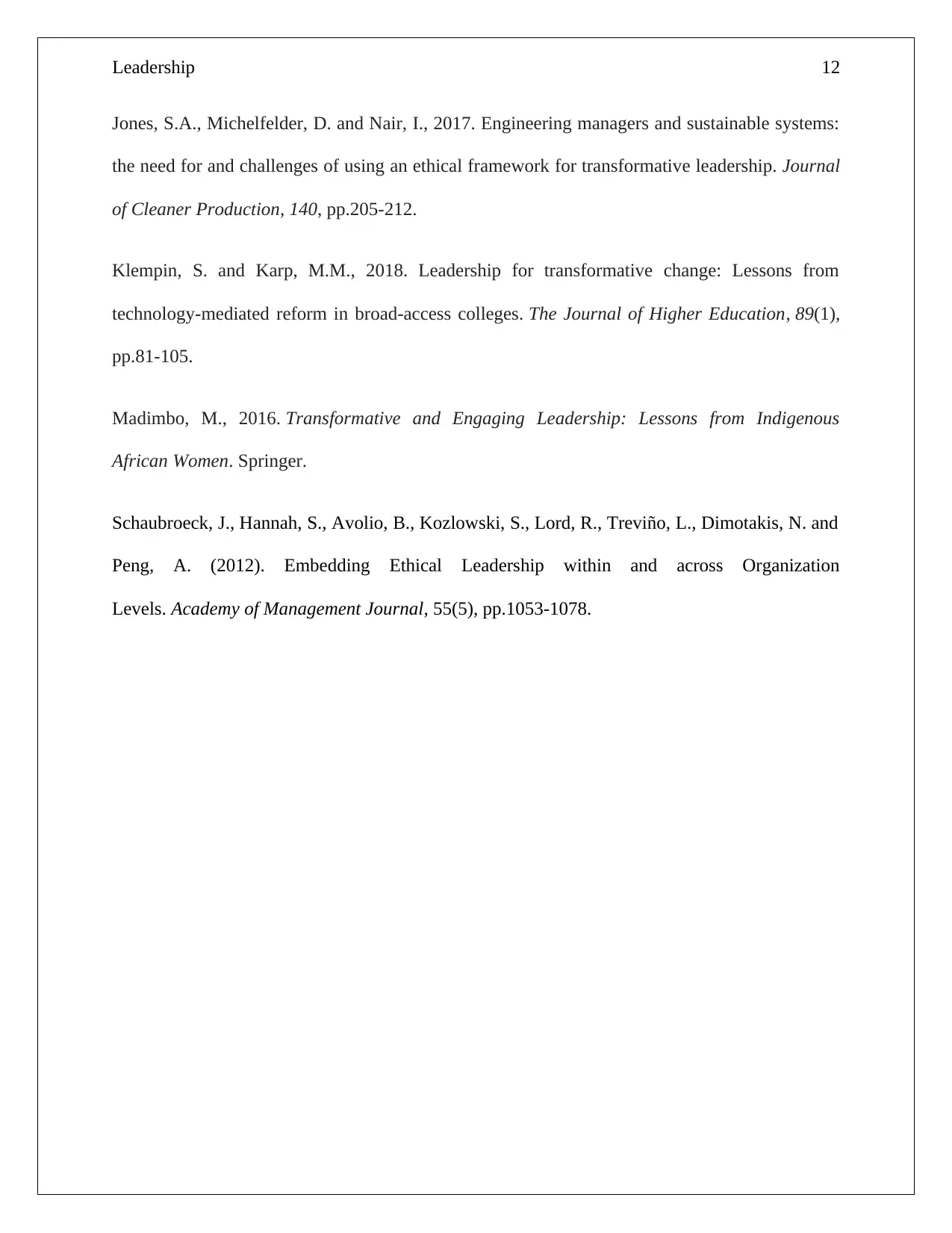
Leadership 12
Jones, S.A., Michelfelder, D. and Nair, I., 2017. Engineering managers and sustainable systems:
the need for and challenges of using an ethical framework for transformative leadership. Journal
of Cleaner Production, 140, pp.205-212.
Klempin, S. and Karp, M.M., 2018. Leadership for transformative change: Lessons from
technology-mediated reform in broad-access colleges. The Journal of Higher Education, 89(1),
pp.81-105.
Madimbo, M., 2016. Transformative and Engaging Leadership: Lessons from Indigenous
African Women. Springer.
Schaubroeck, J., Hannah, S., Avolio, B., Kozlowski, S., Lord, R., Treviño, L., Dimotakis, N. and
Peng, A. (2012). Embedding Ethical Leadership within and across Organization
Levels. Academy of Management Journal, 55(5), pp.1053-1078.
Jones, S.A., Michelfelder, D. and Nair, I., 2017. Engineering managers and sustainable systems:
the need for and challenges of using an ethical framework for transformative leadership. Journal
of Cleaner Production, 140, pp.205-212.
Klempin, S. and Karp, M.M., 2018. Leadership for transformative change: Lessons from
technology-mediated reform in broad-access colleges. The Journal of Higher Education, 89(1),
pp.81-105.
Madimbo, M., 2016. Transformative and Engaging Leadership: Lessons from Indigenous
African Women. Springer.
Schaubroeck, J., Hannah, S., Avolio, B., Kozlowski, S., Lord, R., Treviño, L., Dimotakis, N. and
Peng, A. (2012). Embedding Ethical Leadership within and across Organization
Levels. Academy of Management Journal, 55(5), pp.1053-1078.
⊘ This is a preview!⊘
Do you want full access?
Subscribe today to unlock all pages.

Trusted by 1+ million students worldwide
1 out of 12
Related Documents
Your All-in-One AI-Powered Toolkit for Academic Success.
+13062052269
info@desklib.com
Available 24*7 on WhatsApp / Email
![[object Object]](/_next/static/media/star-bottom.7253800d.svg)
Unlock your academic potential
Copyright © 2020–2026 A2Z Services. All Rights Reserved. Developed and managed by ZUCOL.





